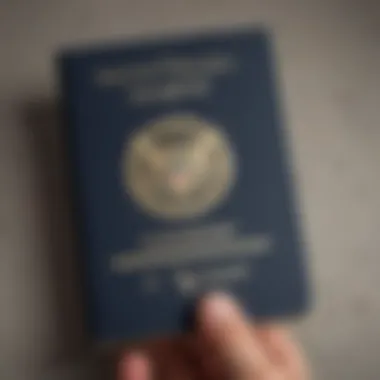Essential Documents for U.S. Passport Renewal


Intro
Renewing a U.S. passport is not as daunting as it may seem, but it requires careful attention to detail, especially concerning the necessary documents. Each requirement has a specific purpose and expedites the processing time and verification of identity. This guide aims to provide clear insights into what documents you need, the reasoning behind these requirements, and the overall renewal process.
The importance of having these documents in order cannot be overstated. A smooth renewal process sets individuals up for successful travel plans and ensures compliance with legal obligations. Understanding what is needed allows applicants to focus on preparing their submissions efficiently.
Coverage Options
While the term 'coverage' typically relates to insurance, for passport renewals, it can metaphorically translate to the various aspects one must cover in terms of documentation. Let's explore the essential documents one needs to account for.
- Completed Application Form: You must submit Form DS-82 for renewal, which can usually be found online.
- Recent Passport Photo: A photo that meets specific size and background requirements is crucial. This will be used for identification purposes.
- Your Most Recent Passport: The document you are renewing is needed as it serves as proof of U.S. citizenship and identity.
- Payment for Renewal Fee: There is a standard processing fee that varies based on the service speed you choose. Payments can typically be made through checks or credit cards.
- Name Change Documents: If your name is different from the one on your most recent passport, you will need to provide legal proof of the change, such as a marriage certificate or court order.
Key Considerations
When preparing for the renewal process, consider the following factors:
- Processing Times: Be aware that standard processing can take weeks, while expedited options are available for an additional fee. Plan accordingly.
- Document Validity: Ensure all documents, especially photos, meet the official specifications to avoid delays.
"Gathering the right documents ahead of time simplifies the renewal process and prevents unnecessary complications."
- Submission Method: Decide whether you will renew by mail or in person, as this decision might impact which documents you will need.
Understanding U.S. Passport Renewal
Renewing a U.S. passport is an important process that ensures individuals maintain their eligibility for international travel. It involves a specific set of requirements and an understanding of the various factors that could affect the renewal process. Having a valid passport ready, particularly if you plan to travel frequently or for extended periods, can safeguard against unexpected travel issues.
Renewing your passport is not only a bureaucratic task but a vital aspect of staying connected to global opportunities. Each country has its own rules regarding passport validity, and many require that your passport remains valid for at least six months beyond your intended stay. Therefore, understanding the nuances of passport renewal is essential for anyone who travels or intends to travel.
What is Passport Renewal?
Passport renewal is the process through which a current passport is updated. Generally, it applies to passports that are undamaged, not significantly altered, and were issued when the applicant was age 16 or older. The renewal process can often be simpler than applying for a new passport, which entails a more complex verification of identity.
To renew a passport, you typically need to fill out the appropriate form, provide a recent photograph, and submit payment for processing fees. The U.S. passport system facilitates this process to allow for quicker turnaround times, primarily through the use of Form DS-82 for eligible applicants.
Why Renew Your Passport?
Several reasons make passport renewal a necessary consideration for travelers:
- Travel Plans: If you have upcoming international travel, a valid passport is a critical requirement. Most countries require that travelers present a passport that is valid for at least six months beyond their planned departure date.
- Changes in Personal Status: Life changes, such as marriage or divorce, may necessitate a name change on your passport. Keeping your passport updated reflects your current identity.
- Aging and Wear: Over time, passports can deteriorate. This wear might cause issues at borders if the passport becomes difficult to read or shows signs of damage.
- Compliance with Laws: Each country has regulations about passport validity. Renewing your passport ensures compliance with these regulations, avoiding potential travel issues.
In summary, understanding the importance of passport renewal plays a crucial role in preparing for both planned and spontaneous international travel. Having a renewed passport can add convenience and peace of mind as you explore the world.
Eligibility for Renewal
Understanding the eligibility criteria for U.S. passport renewal is crucial for an efficient application process. Being eligible means that you can renew your passport without having to apply for a new one. This can save time and reduce complications. Proper knowledge of eligibility criteria helps you prepare the correct documents and avoid delays, which can be common if the requirements are misunderstood.
Basic Eligibility Criteria
To renew your U.S. passport, you need to meet a set of basic criteria. These are the foundational elements that determine your eligibility. The primary conditions are:
- Ownership of the Current Passport: You must have a passport that is undamaged, issued when you were age 16 or older, and issued within the last 15 years.
- Past Passport Issuance: The passport must have been issued in your current name or you must provide appropriate documentation for a name change.
- U.S. Citizenship: You need to be a U.S. citizen. This can usually be established by your passport or additional documents if necessary.
When these criteria are met, you have a streamlined path to renew your passport through Form DS-82. Ensure that all documents align with these points to avoid unnecessary complexities.
Exceptions to Standard Requirements


While the basic eligibility criteria generally apply, there are exceptions that certain individuals may encounter. Understanding these exceptions is important as they can affect the renewal process of your passport. Here are some notable exceptions:
- Lost or Stolen Passports: If your passport is lost or stolen, you cannot renew it by mail. Instead, you must apply for a new passport using Form DS-11.
- Significant Damage: Should your passport be damaged, it must be submitted along with your application, and you might need to apply in person.
- Name Change without Documentation: If your name has changed but you do not possess the necessary documentation to prove the change, you may face difficulties. It is advisable to collect this paperwork beforehand.
Being informed about these exceptions can help you prepare adequately for any unique situations that may arise during your renewal process. Make sure to thoroughly check your circumstances against the eligibility criteria to ensure a smooth renewal journey.
Required Documents for Passport Renewal
When renewing a U.S. passport, it is critical to gather the necessary documents. These required documents streamline the renewal process. They ensure your application is complete, reducing potential delays. Understanding what is needed can help prevent missteps. This section outlines important documents required for a successful passport renewal.
Completed Application Form
Form DS-82 Overview
The completed application form is a cornerstone of the renewal process. The Form DS-82 is specifically designed for renewing passports by mail for eligible individuals. This form is straightforward and helps the application process move more smoothly. A key characteristic of the Form DS-82 is its simplicity, which allows you to fill it out with basic personal information along with your passport details. Its straightforward nature makes it a popular option among applicants.
One unique feature of this form is that it permits applicants to apply for a passport renewal without resubmitting documents like proof of citizenship. Instead, the existing passport is sufficient. This is an advantage that saves time and effort for those who are eligible to use Form DS-82.
How to Fill Out the Form Correctly
Filling out the Form DS-82 correctly is essential for avoiding processing delays. The process involves providing accurate information about your identity, including name, date of birth, and passport number. A crucial aspect is to follow the outlined instructions carefully to ensure every section is filled out properly.
A unique feature of the filling-out process is the clear guidelines provided on the form itself. These instructions guide applicants on how to answer each question, ensuring no detail is overlooked. Failure to complete the form correctly may result in rejection or requests for additional information, which can extend the wait time for your passport.
Current Passport
Importance of the Existing Passport
Your current passport plays a significant role in the renewal process. It serves as proof of your U.S. citizenship and identity. This document is indispensable as it provides essential details like your photograph and signature, which are necessary for your new passport. The existing passport's validity does not necessarily affect your renewal capability; as long as it is not significantly damaged and meets other criteria, it can be used.
One more advantage of having your existing passport is that it facilitates a quicker renewal process. You do not have to provide additional proof of citizenship, which saves both time and resources during the application.
What to Do If It’s Lost or Stolen
In situations where your existing passport is lost or stolen, the renewal process changes. Firstly, it's important to report the loss or theft to the U.S. State Department. This helps prevent identity theft. After reporting, you need to apply using the Form DS-11, which is for applicants who do not have their current passport.
A key characteristic of this situation is that you will need to provide different documentation, such as proof of U.S. citizenship, which might add complexity to your application. This can prolong processing time, making it crucial to keep an eye on your passport.
Passport Photo Requirements
Specifications for Your Photo
One important aspect of the passport renewal process is the photo you submit. The specifications for this photo are strict, requiring a headshot, specific dimensions, and background color. Ensuring your photo meets these requirements is critical. Non-compliance can lead to delays or even rejection of your application.
A unique feature of the specifications is the emphasis on clarity and lighting. The photo needs to have a neutral expression and be free of shadows. Proper adherence to these guidelines is paramount for a successful passport renewal.
Common Mistakes to Avoid
Common mistakes can often derail the application process. Many applicants overlook crucial details like the dimensions of the photo or fail to use the correct background color. Another frequent error is wearing glasses, which is generally not allowed due to reflections.
Being aware of these common pitfalls can help enhance your application. It ensures that your photos meet the specifications, minimizing the chances of delays or rejections.
Payment for Renewal Fee
Acceptable Payment Methods
To process your passport renewal, you must pay a fee. Understanding acceptable payment methods is fundamental to ensuring your application is not stalled due to payment issues. Payment can generally be made using a check or money order made out to "U.S. Department of State." This method is standard and widely accepted.


Also, some locations allow credit card payments. Being aware of your payment options can facilitate a smoother renewal process, avoiding unnecessary delays.
Fee Structure Breakdown
The fee structure for passport renewal varies based on different factors. It’s important to understand how much you need to pay. Basic renewal fees can change, and there may be additional costs for expedited processing.
A unique feature of this structure is the availability of updates on the official U.S. Department of State website. This resource provides current fee information, ensuring that applicants are fully informed before submitting their renewal.
Overall, having the right documents and proper understanding of requirements will help in obtaining a renewed passport efficiently.
Additional Documents for Specific Cases
When renewing a U.S. passport, certain situations require additional documentation. This section discusses these special cases, ensuring that individuals are fully aware of the extra steps they may need to take. Understanding these requirements can make a significant difference in the smoothness of the renewal process.
Name Change Documentation
Types of Acceptable Documents
If you have changed your name since your last passport was issued, you must provide valid documentation demonstrating this change. Permissible documents include marriage certificates, divorce decrees, or court-ordered name changes. Each of these documents serves the purpose of showing a legal transition from your previous name to your current one.
The primary characteristics that make these accepted documents important are their legal validity and clarity in conveying your identity change. They play a crucial role in reinforcing your application. For many, providing original copies of marriage certificates or similar documents is a beneficial method, as they can often be quickly obtained from the state or county of issuance. However, care should be taken, as some documents might require translation if not in English, which can add unnecessary complexity to the renewal.
How to Present Name Change Evidence
Proper presentation of name change evidence is vital. When submitting your passport renewal application, include your name change documents alongside the required paperwork. Ensure that these documents are originals or certified copies, not just photocopies. A common mistake is to send an non-certified document, which could lead to delays.
The clarity and organization of your submission matter. Presenting documents in a neat packet can help avoid confusion and facilitate easier processing. This helps not only you but also the officials who review your application, ensuring that everything needed is readily accessible. Sometimes, including a brief cover letter explaining the reason for the name change can also enhance your submission.
Minor Passport Renewal
Documents Required for Minors
Renewing a passport for a minor involves specific documents that differ from those needed for adults. The process usually demands proof of the child’s citizenship, like a birth certificate or naturalization certificate. Moreover, a current passport photo that meets federal guidelines is required.
The unique characteristic of these documents is their emphasis on verifying the identity and citizenship of a child, which necessitates additional care. This requirement aims to protect children’s identity and ensure safe travel. Notably, parents or guardians should be prepared to provide documentation not only for the child but also proof of their relationship to the minor, like a custody agreement in some cases.
Parental Consent Documentation
For minor passport renewal applications, parental consent is a central requirement. Both parents or legal guardians must authorize the renewal process. If one parent is unavailable, a notarized statement from the absent parent may be necessary.
This requirement underscores the need for cooperation and agreement between parents regarding the travel plans of their children. The process is beneficial as it prevents unauthorized travel and ensures a child's safety. A unique feature of this documentation requirement is that it mandates that consent must be clearly documented, which can prevent future misunderstandings or disputes. It serves to create a safer travel environment for minors.
Parents should always double-check the requirements for their specific circumstance to ensure a smooth application process.
Submitting Your Renewal Application
Submitting your renewal application is a crucial step in the passport renewal process. This step ensures that all required documents reach the appropriate authorities to process your request efficiently. An incomplete or improperly submitted application can lead to delays, which can be inconvenient, especially if you have upcoming travel plans. Understanding where and how to submit your application makes this process smoother.
Where to Submit Your Application
When it comes to submitting your passport renewal application, there are several options based on your convenience and urgency. You can submit your application through the mail or, in some cases, drop it off at a nearby processing center.
- By Mail: Majority of applicants will find mailing their application to be the most convenient. You should send your completed Form DS-82 along with all required documents to the address specified for passport renewals on the form. Make sure to use a secure envelope and consider choosing a trackable mailing option to ensure its safe arrival.
- In-person: If you need your passport renewed urgently, you might want to apply in person at a passport agency or center. This option is often recommended if you have urgent travel plans, but it requires an appointment.
Processing Times for Renewal


The processing time for passport renewals can vary considerably based on various factors such as demand and the methods you choose. Understanding typical processing times can help in planning your travel and avoiding last-minute rushes.
Typical Processing Times
The typical processing time for routine passport renewal is usually around 10 to 12 weeks. However, it can take longer during periods of peak demand, such as travel seasons or around holidays. This characteristic of processing times emphasizes the importance of applying early to avoid delays.
- Key Feature: Anticipating a standard processing time allows applicants to schedule their travels without the stress of last-minute documentation issues.
- Advantages: Choosing this method is often more economical than expedited services, making it a popular choice among applicants who can afford to wait.
Expedited Services Options
For those who cannot wait for the standard processing times, expedited services are a viable option. These services often promise quicker turnaround times, typically within 5 to 7 weeks. This option is especially beneficial for travelers with urgent timelines.
- Key Characteristic: Expedited service is preferred for its speed, allowing individuals to receive their passports in a much shorter timeframe.
- Unique Feature: While there is an additional fee for this service, it can be worth it for those needing urgent travel. Keep in mind, even expedited requests can still face delays if there are issues with your application.
Always check the U.S. State Department's website for the latest updates on processing times, as these can fluctuate based on various circumstances.
Common Issues and Solutions
Navigating the process of U.S. passport renewal can be complex. Many individuals face challenges that can hinder a smooth experience. This section addresses common problems and how to resolve them. Understanding these issues can help minimize frustration and ensure timely processing of your application.
Delays in Processing
Delays in processing passport renewals are not uncommon. A variety of factors can contribute to these delays, such as understaffing, increased application volumes, or incomplete documentation.
Factors Leading to Delays
- High Volume of Applications: During peak travel seasons, processing times can extend significantly due to increased demand.
- Inaccurate Information: If your application contains errors or missing information, it may be returned for corrections, delaying the renewal.
- Background Checks: Security checks are necessary, and any complications can lead to additional processing time.
To mitigate these delays, complete your application meticulously. Double-check all information and ensure you have included every required document. You might also consider submitting your application through expedited services if you need your passport urgently.
Incorrect Documentation
Providing correct documentation is critical for a successful passport renewal. Submitting improper documents can lead to denials or delays.
Common Documentation Issues
- Outdated Photos: Passport photos must adhere to strict guidelines. Failing to meet these can result in a rejection of your application.
- Missing Signature: Forgetting to sign your application form is a simple mistake that can cause significant delays.
- Inadequate Proof of Identity: If you change your name and do not provide necessary documents (like marriage certificates), this can also complicate the process.
To avoid these issues, follow the specific requirements outlined in your renewal instructions carefully. Verify that all your forms and documents are up-to-date and accurate before submission.
Remember, being thorough and attentive can save you time and ensure your passport renewal goes as smoothly as possible.
Final Thoughts
Navigating the labyrinth of U.S. passport renewal can be daunting for many. However, recognizing the vital role of staying informed about the changing requirements can substantially ease this process. In this article, we emphasize the need to be aware of updates to documentation, forms, and processing times, which may evolve due to policy changes or external factors.
One primary benefit of being proactive in your research is the avoidance of unnecessary delays. For instance, knowing specific document requirements can prevent the frustration of being turned away at the submission stage. Additionally, remaining updated provides clarity, which is essential for proper planning — especially for those who have upcoming travel plans.
It is also worth noting that the U.S. State Department's website serves as a reliable and easily accessible resource for current passport regulations. \nRegularly checking this source can provide information on national policies that impact passport processing, like response to COVID-19 or natural disasters.
Staying abreast of changes can determine whether your passport renewal experience is smooth or fraught with complications.
In summary, approaching passport renewal with a mindset of diligence and preparedness can save time and reduce stress. Your passport is an important document, and ensuring its timely renewal without hassle is crucial for personal and professional endeavors.
Staying Informed About Changes in Requirements
Awareness of any amendments in passport renewal procedures is indispensable. Factors influencing these changes may include shifts in government policy or global events. To illustrate, during the pandemic, the U.S. embraced temporary modifications that affected both processing times and requirements.
Regularly consulting official resources can ensure you have the latest information:
- U.S. State Department Website: The most authoritative source for changes in documentation requirements.
- Social Media Updates: Platforms like Facebook and Twitter often provide immediate updates regarding processing times and emergent situations.
In summary, staying informed is not just beneficial; it's necessary to streamline the passport renewal process and eliminate obstacles. By knowing what to expect, you can plan accordingly, allowing for a more seamless experience.



